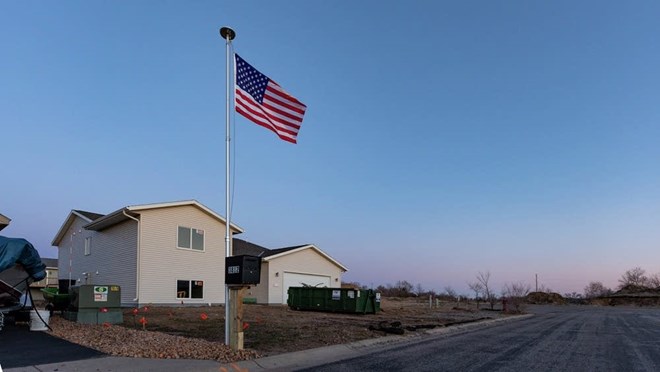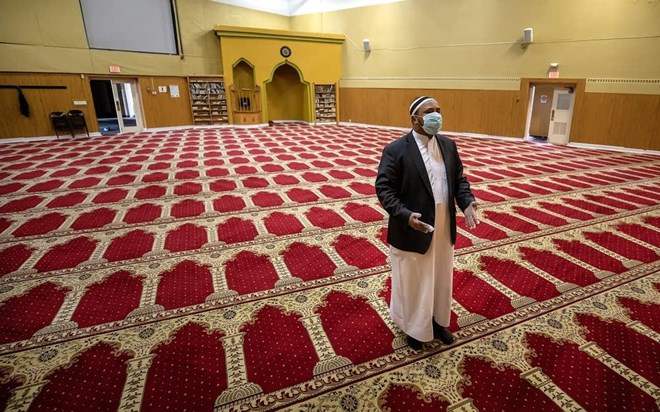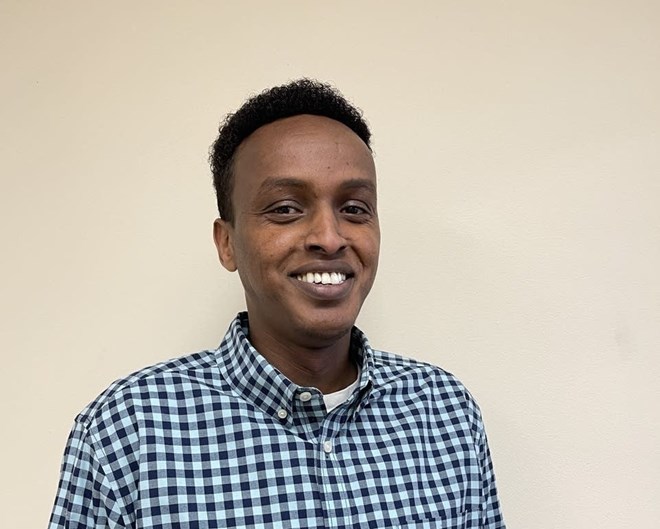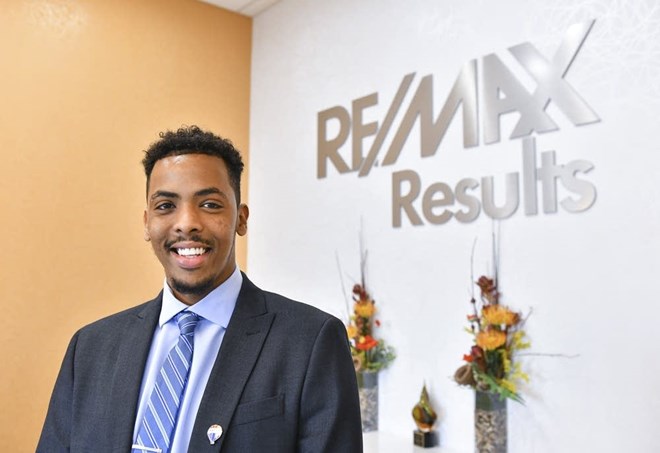
Thursday April 14, 2022
By Kirsti Marohn
Home ownership interest is rising, but hurdles remain steepKirsti Marohn

A newly constructed home in the south region of St. Cloud awaits the finishing touches Friday April 9, 2022.Paul Middlestaedt for MPR News
Bishar Hassan’s parents and five siblings had lived as renters in the 16 years since coming to the United States. But their rental house felt increasingly cramped, and when the building’s owner said he was selling, Hassan knew it was time to move.
He helped his family buy a house in north St. Cloud, with a large yard, three bathrooms and at 2,900 square feet, far more space than they had before. Equally important to him, it put them on a path to building wealth.
“When you're renting, you're actually paying someone else's mortgage and you're not really getting anything back,” Hassan said. “But when you own a house, it's an investment for you, and you get that back.”
Owning a home has long been viewed as an economic stepping stone in America, a source of pride that can build generational wealth for families and stability for neighborhoods and cities.
It’s a prize, though, that Minnesota’s new immigrants sometimes find out of reach. While many have the income to buy a home, they face significant challenges, including rising home prices, an extremely tight real estate market and, in some places, prejudices that make them feel unwelcome.
Muslims face another unique barrier: a rule in Islam that prohibits profiting from lending or receiving money. So getting a conventional mortgage that charges interest isn’t permitted.
With St. Cloud’s East African population rising rapidly, finding answers is important to the city’s future. As many as 70 percent of the region’s Somali community lives below the federal poverty line, according to a recent Wilder Foundation report. Home ownership can be a poverty fighter.
‘American dream’ elusive
Mohamed Nuh Dahir rented an apartment when he first came to St. Cloud 20 years ago. After he got married and had five children, Dahir said the three-bedroom apartment was getting crowded.
After looking for years for opportunities to buy a home without paying interest, he purchased a five-bedroom house in southeast St. Cloud in 2020 that offers his family more space.
“Everyone is happy,” he said. “Everyone has their own room. They have an area they can play. It’s so different.”
Dahir, who is imam of the Islamic Center of St. Cloud, said he thinks home ownership benefits people of all communities, but especially for Somali families, who tend to be larger and close-knit. He said more families have been looking to buy homes in the past couple of years, and the mosque sometimes offers educational classes on home ownership.

Imam Mohamed Nuh Dahir stands at the Islamic Center of St. Cloud on April 17, 2020.Paul Middlestaedt for MPR News 2020
“One part of Somali culture is we see each other on holidays and we stay together for a couple of nights,” Dahir said. “So it’s important for them to have a home.”
Home ownership rates among St. Cloud’s Somali community, however, are considerably lower than other populations, said Mónica García-Pérez, an economics professor at St. Cloud State University.
She analyzed data from the U.S. Census Bureau’s American Community Survey and found it’s just 7 or 8 percent — much lower than that of African American or Latino communities, or among white residents.
Because homes tend to increase in value, the lower home ownership rate has likely made it harder for the Somali community to build wealth that can be transferred across generations, García-Pérez said.
“Home ownership — real estate — has been one of the faster growing wealth accumulators in the U.S.,” she said.
There’s a strong connection between lower home ownership rates and poverty, said Shirwa Adan, executive director of the Central Minnesota Community Empowerment Organization.
“When you are paying $1,500 [a month] for a four-bedroom apartment, that could have been your mortgage,” he said. “But that rent money you’re giving every month, that is not coming back to you in terms of a tax return or even purchasing a piece of your home every month.”
Adan’s group was formed in 2015 by Somali elders to help the East African community bridge language and cultural barriers to applying for jobs and housing, navigating the health care system and starting businesses.
During the COVID-19 pandemic, the organization has helped many families get rent support, Adan said. But lately, a growing number of families are interested in buying homes.
“If you own a home and it takes you 30 years to pay it off, after 30 years, your kids have a place they can call home,” he said. “I think it’s really a huge aspect of building wealth and getting into that American dream of having your family sustain and not pay rent every month, because they have something that they own.”
‘Nobody had savings’
New immigrant families, however, often face other obstacles to home ownership, including a lack of knowledge of the real estate process, and language barriers that make the already-complex paperwork even more daunting.
And after years of renting, many families don’t have the savings for a down payment on a home, said Johanna Osman, executive director of the Sakan Community Resource, a Twin Cities nonprofit.
Shirwa Adan, executive director of the Central Minnesota Community Empowerment Organization.Kirsti Marohn | MPR News
“They were living paycheck to paycheck, maybe,” she said. “And so nobody had savings. And because of all those years of avoiding using credit, they had no credit score.”
Since starting in 2017, Sakan has raised money from the community to provide down payment assistance for about 350 families, Osman said. It also offers financial literacy and homeowner readiness programs, and recently expanded those to central Minnesota.
Many families go through Islamic financing companies to get a no-interest loan, but there are also predatory lenders who are purchasing houses and offering them for sale by contract for deed, Osman said.
“The community doesn't understand that with a contract for deed, yeah, there's no interest. But if something happens, like COVID, in the middle of it, you don't own anything,” she said. “You don't own that house until you pay your last payment.”
Adan said some local real estate agents have been selling homes on a contract for deed, giving families 10 years to pay the cost instead of 30 years like a traditional mortgage. The monthly payments are often high, and the homebuyer usually is required to pay additional money at the end of every year, he said.
Ten years is a long time for something to go wrong in a family’s life that could leave them unable to make those payments, Adan said. If the buyer is unable to make the lump sum payment at the end of the year, the seller could take back the home.
“A lot of people in our community do not want to go to maybe Wells Fargo and get a mortgage, even though they might have the credit and the financial means to do so,” Adan said. “They’re not able to take that loan with interest.”
Farhan Jibril grew up in a Somali American family in St. Cloud, and now works as a real estate agent, helping other Somali families navigate the homebuying process.
For families planning to stay in St. Cloud for the long term, owning a home rather than renting makes sense, he said, and can also help them get loans for college or to start a business. 
Farhan Jibril poses for a photo in the ReMax offices in St. Cloud on Friday, Sept. 21, 2021.David Schwarz | The St. Cloud Times
“I think initially, just building that generational wealth for your kids,” Jibril said. “If you’re a parent, the most important thing should be, ‘How do I put my kids in a better position 20 years from now?’”
There are other less tangible benefits to home ownership for Somalis, who have faced some hostility since first settling in central Minnesota two decades ago. Owning a home makes it easier for neighbors to get to know one another, Jibril said.
“Because not only are you paying taxes, but you're also becoming a part of the community,” he said. “You're doing your lawn. You're also getting to know your neighbor, taking them some Somali foods and traditional foods, teaching them about the religion. And they also see how you live.”
‘Making Minnesota their home’
Beyond homebuying, the St. Cloud region still struggles to meet the housing needs of many of its new residents.
It’s often difficult for immigrant families to find four- or five-bedroom apartments in central Minnesota that are large enough to accommodate families with several children, Adan said.
“So if you have six or seven kids, when they are 3, 4 or 5 years old, or even elementary, it is kind of OK to have them in the same room,” Adan said. “But at some point, the landlord is going to tell you … ‘Hey, you have too many people.’”
In St. Cloud, families sometimes have more luck finding a house than an apartment with the needed space. That’s what Bishar Hassan discovered when he secured a home in north St. Cloud for his parents and siblings.
Hassan, 36, was able to overcome Islam’s prohibition against interest by securing a no-interest mortgage through an Islamic-approved, or halal, financing service.
While there are different types of arrangements, they typically are structured as a partnership between the homebuyer and the financing company. The homebuyer makes monthly payments to the financing provider, increasing their investment in the home over time.
Although Hassan’s parents and siblings moved into their new house in February, he still lives in an apartment with his wife and their two young children.
They have enough space for now, but Hassan would like to move into a house himself someday, and he believes more in the East African community will be looking for opportunities to do the same as they work to grow their families and put down roots.
“I think in the long run,” he said, “it shows you that people are making Minnesota their home, which is a good thing.”